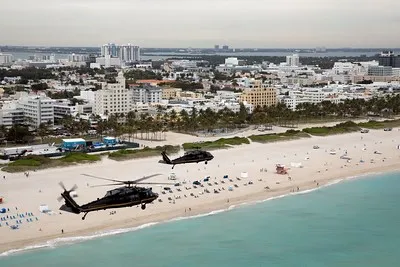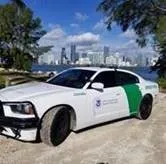While the NFL gets ready to kick off the biggest game of the year, CBP plays a significant role in Super Bowl security

Border Protection’s Air and Marine Operations patrol the
airspace in advance of Super Bowl LIV in Miami, Jan. 27.
Photo by Jerry Glaser
The atmosphere is electric with anticipation. It’s a day the team has prepared for all year; some of those involved have waited their entire lives to be part of this big game. It’ll be an all-out effort for everyone, laying everything on the line for a game plan that includes a defensive front in the air, on the ground, and even on the water. It’s the build-up to Super Bowl Sunday, but the team isn’t the San Francisco 49ers or Kansas City Chiefs; it’s Team CBP – U.S. Customs and Border Protection – taking the field in Miami and the entire South Florida region, doing what it does every day: safeguarding America's borders while enabling legitimate trade and travel.
“We’re part of a huge law enforcement team down here in South Florida to ensure the integrity and security of both the game itself and the events leading up to it,” said Diane Sabatino, the Director of Field Operations for CBP’s Miami and Tampa areas and the lead for CBP’s role in Super Bowl security. “We have a number of missions in support of the national special security event.”
Sabatino and the team of approximately 150 CBP officers, Border Patrol agents and Air and Marine agents at the game will play many roles. Air crews will patrol the skies and enforce a no-fly zone around the site, interceptor boats will ply the warm waters off the coast, and X-ray equipment operators will scan the thousands of personal vehicles and trucks bringing people, goods and equipment into the venues. Border Patrol agents will augment local police and sheriff department officers, and CBP specialists will watch out for counterfeit merchandise ranging from fake jerseys to Super Bowl rings. Others have been training local law enforcement and working to stop human trafficking which many times can end in innocent victims being sold into the sex slave trade. CBP’s law enforcement personnel do all this while still carrying out their primary mission of protecting America’s borders.
“We’re still looking for that traffic that could be trying to use something like a national special security event that could be potentially drawing us away from our day-to-day operations and looking to exploit the event to conduct some criminal activity,” Sabatino said.
Putting Together the X’s and O’s of the Game Plan
The gargantuan effort began two years ago and increased in intensity last year with careful coordination between CBP and a host of federal, state and local law enforcement agencies.
“The first time you engage with someone can’t be the day before the event or when something happens,” Sabatino said. “That speaks volumes to the partnerships we have down here and engaging so early.”
CBP not being an unknown quantity to law enforcement in the region makes a world of difference in the coordination efforts.
“The locals really rely on us,” said Eddie Alvarez, the lead planner for CBP in Miami. For example, a CBP Air and Marine Operations command vehicle is already hooked up with a Miami-Dade Police Department command vehicle. “Between the two, they’ll be able to provide video footage to all the command posts around the city, providing real-time information that’s critical when an incident takes place. Who are the first people in their minds when it comes to stuff like that? It’s us, because of the history, capabilities and partnerships previously built up.”
About 1,000 miles to the north, CBP planners in Washington, D.C., are getting information from those on the ground in Miami. One of the more valuable methods for communication is WebEOC, a secure, internet-based, virtual emergency operations center used by federal, state, and local agencies to share information, maintain situational awareness, and view requests for support during an incident.
“In addition to sharing information, we can better understand the nature of a request, how to meet it, who is best to act on the request, and ensure all the important information is communicated to get that request met,” said Dwayne Myal, the lead planner at CBP headquarters in Washington for the agency’s Super Bowl security efforts.
WebEOC has been particularly helpful to CBP to stay on top of things for some pretty high-profile events – from migrant caravans coming to the Southwest Border to hurricanes to the most recent coronavirus outbreak from China. “There’s no shortage of incidents where we’ve used WebEOC to better understand and help us manage them,” Myal said.
Air (and Water) Security

Miami, prior to Super Bowl LIV. CBP is working alongside
a vast network of South Florida public safety partners
as part of coordinated security efforts ahead of
the Super Bowl. Photo by Ozzy Trevino
CBP is well positioned to offer its corps of defensive backs and safeties. Assets in the air and on the water in Miami include more than half a dozen helicopters, planes and numerous boats. UH-60 Black Hawk helicopters will help enforce a no-fly zone around the stadium area; AS-350 – better known as AStar – helicopters with high-tech cameras will send real-time video feeds back to those command vehicles Alvarez mentioned, as well as to headquarters, to make sure everyone can see and share what they see with the appropriate responders. If a threat is detected, some of the choppers and boats will transport and drop in special response teams to the scene at a moment’s notice. CBP’s Air and Marine Operations capabilities are pretty unique to law enforcement organizations.
“We fill in the gaps in capabilities state and local agencies don’t have,” said Martin Wade, Director, Miami Air and Marine Branch and lead for Air and Marine Operations at the Super Bowl. “That’s part of why we get asked to participate in events like this: the value we add to the security operation.”
He also cautioned anyone who thinks this might be a good time to try to come into in South Florida illegally or smuggle drugs into the area.
“Bad guys are bad guys and might think all law enforcement is tied up with all these Super Bowl missions, and everything is wide open,” Wade said. “Bad idea. We and our partner agencies will continue to patrol the air and maritime approaches to Southeast Florida.”
Putting up a Front on the Ground

Agent Winston Guzman
CBP’s ground defense is led by its own version of the front four: Border Patrol agents. These are the men and women who get down in the trenches to work with other local, state and federal law enforcement partners to put up a defensive front line. Nearly 20 additional Border Patrol agents went to South Florida from around the country to beef up the security posture.
“Border Patrol agents have a unique skill set,” said Assistant Chief Patrol Agent Peter Daniel, assigned to the Miami Sector Border Patrol station, an area that includes 1,200 miles of coast line and requires a complex and strategic deployment of people and resources to conduct its border security mission. “One of the most important characteristics of the Border Patrol to provide security at the Super Bowl is that we operate 24/7,” one of the few federal law enforcement agencies to do so for all kinds of cross-border threats.
Daniel characterized Super Bowl security as a surge event, a common practice agents have gone through many times.
“We are accustomed to responding to large and sometimes traumatic events,” also including the hurricanes over the past couple of years, he said. “We’ve been able to practice working as a cohesive team, working jointly with our partners [in the law enforcement community]. That experience we’ve had particularly in Florida in the last seven years, has really given us experience we can use to ensure the safety of the Super Bowl.”
Reading the Opponent Like a Linebacker
Peering into the offensive backfield to read what the offense might try to do is a bit like what CBP’s Office of Field Operations is doing. Thousands of vehicles that carry in the food, souvenirs, high-definition television equipment and fans are being brought into the Super Bowl stadium area. To make sure none of those vehicles and trailers have anything in them that’s not supposed to be in the area, CBP uses its large X-ray machines to scan the trucks and containers in a matter of seconds.

advance of Super Bowl LIV, in Miami Gardens,
Florida, Jan. 28.
“[We] make sure that everything going into the stadium is scanned for any kind of threat,” CBP Officer Gary Nellis said in a news conference Jan. 23. “What we’re going to be seeing in these vehicles is everything that’s going to be brought into the stadium for whatever purpose: everything from team equipment to limousines transporting folks, all kinds of supplies, and everything will be scanned by us on a daily basis.”
In addition, CBP supports coordinated efforts before the Super Bowl to target counterfeit sports merchandise, which has economic impacts, legal implications, and health and safety risks. CBP enforces more than 400 laws for 40 U.S. agencies and is committed to protecting consumers and enforcing U.S. trade.
Stopping Human Trafficking
Another aspect of Super Bowl security that involves CBP that might not be as visible – but no less important – is the agency’s role in stopping human trafficking. On Jan. 17, a couple of weeks before the game, CBP officers helped train airport workers how to recognize the signs of someone being brought into the country for the illicit sex industry, an all-too prevalent crime at high-profile events, especially the Super Bowl (see the CBP feature article, “Protecting the Innocent”). The same techniques CBP uses to prevent the entry of terrorists and other criminals also help it intercept human traffickers and the victims of human trafficking.
“Our personnel kicked off Operation Renegade (a joint effort between CBP and Homeland Security Investigations to identify victims and targets engaged in human trafficking and prostitution entering or traveling through the United States) at Miami International Airport in 2017,” Sabatino said. “With the information we’ve been able to glean – the intelligence, how we identify these victims, how we identify these traffickers – we wanted to make sure we had our partners who are going to be involved, certainly in the Super Bowl, invested in the information we have made available to them, so they can reach back to us, and we can push intel out to them. We want to make sure all of our partners have the best information available.”
The Winning Game Plan Comes Together
Analysts might debate how the 49ers and Chiefs need to plan: whether San Francisco keeps the ball on the ground to duplicate their playoff success or match Kansas City’s potent air offense and defense and how the Chiefs will counter with their own running and passing game. As far as Sabatino is concerned, a winning game plan for CBP is all threats mitigated – on the ground, in the air and on the sea – and cooperation ties strengthened with law enforcement partners in South Florida.
“I think that ultimately if we have a safe and secure game, that is going to be a final tell,” she said.

